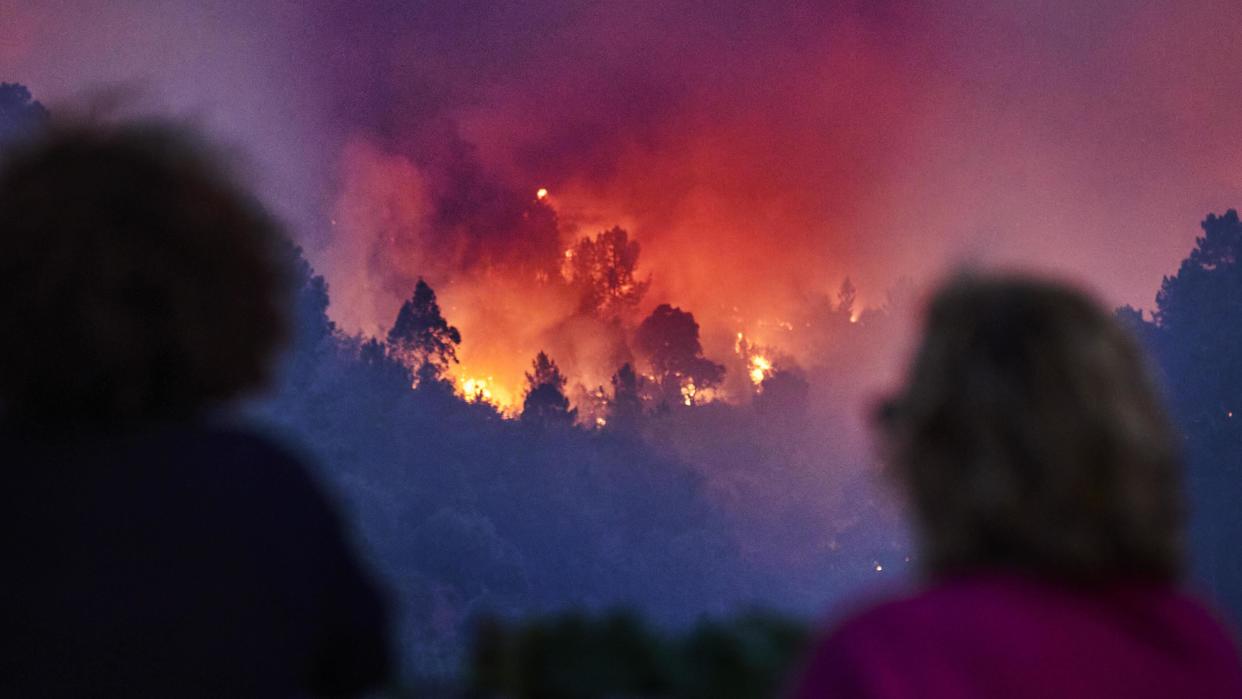Three firefighters die tackling Portugal wildfires
At least seven people, including three firefighters, have died as wildfires continue to rage across Portugal, according to local news outlets.
Parts of the country have been ablaze since the weekend, with temperatures in some areas topping 30C (86F). The northern and central parts have been worst affected.
The firefighters - two women and a man - died while tackling a blaze in Tábua in Coimbra, central Portugal, the country's civil protection authority said.
More than 5,000 firefighters have been tackling the wildfires that Portuguese Prime Minister Luís Montenegro said are "raging across the country".
Ten thousand hectares (37 sq miles) have already been burned between Porto and Aveiro in the north, the Portuguese news agency Lusa said on Monday.
André Fernandes, Portugal's national civil protection commander, said that there were 65 fires in progress at 13:00 local time (13:00 BST) on Tuesday.
Local media reported that hospitals in affected areas have received people with burns, breathing difficulties and other injuries from the fires. At least 12 firefighters have been injured, two seriously, reports say.
Police have shut motorways, including the main road between the capital, Lisbon, and Porto, and dozens of houses have been destroyed by the fire. Many schools in Gondomar, an area near central Porto, closed on Tuesday, its mayor said.
Vehicle caught fire
Portugal's civil protection authority named the three firefighters who died as Sonia Cláudia Melo, Paulo Jorge Santos, and Susana Cristina Carvalho.
The president of Portugal, Marcelo Rebelo de Sousa, said that he was “deeply saddened” by the deaths and Montenegro issued a note of condolence.
Mr Fernandes said the vehicle caught fire but that it wasn't clear whether it had crashed beforehand, according to the news agency, AP.
Two more firefighters were injured during the incident, he added.
Montenegro had previously said that firefighter João Silva had died of "a sudden illness" while battling a blaze in Oliveira de Azeméis.
The EU said it would send eight firefighting planes to Portugal to help it tackle the severe blazes.
EU Commission President Ursula von der Leyen said the bloc was "urgently mobilising" and urged other member states to send further assistance.
Montenegro also thanked France, Greece, Italy and Spain for their "rapid and essential help in combating this scourge" in a post on X.
Portugal already owns 30 water bombers - and has deployed over 1,500 fire engines - but authorities said the complex situation required additional support.

Several fires that broke out in the Aveiro region over the weekend forced about 70 residents to flee, the civil protection authority has said.
"The situation is not out of control, but it is very complex," Fernandes said.
Portugal and neighbouring Spain have recorded fewer wildfires this year, largely due to a wet and rainy start to the year. But they remain vulnerable to blazes due to hot and dry conditions.
Climate change increases the risk of the hot, dry weather that is likely to fuel wildfires.
The world has already warmed by about 1.1C since the industrial era began and temperatures will keep rising unless rapid efforts to curb greenhouse gas emissions are made.
